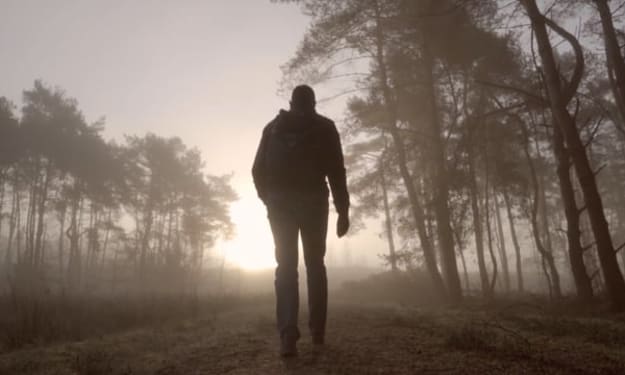Why Is It Better To Come Third Than Second?
Change this one perspective and savour your success

Mack Robinson smashed the world record for the 200 meters — but nobody remembers him.
In the 1936 Summer Olympics, Mack ran in the 200m final and crossed the line in 21.1 seconds shaving 0.1 of a second off the old record. But nobody remembers him because Mack finished behind four-time gold medalist Jesse Owens.
The anonymity of second place is often hard to take. It can destroy the winning mindset of athletes who nearly got there. And there is no more illustrative case in point than the story of Jamie Henthorn.
Sprinters need fast muscles
Jamie Henthorn had fast muscles. Muscles he inherited.
His 6ft 4” father had been a 100m champion in college. He competed in every army sports day during his national service, winning the British army 100m championship in a time that remained unbeaten for 24 years.
His 6ft mother was also sporty. She excelled at the high jump; she broke her school high jump record and represented Scotland at several athletics events before she gave it up to get married and have a child — along came Jamie.
Jamie was a typical child. He liked to run around the playground playing tag with his friends, who could never catch him. He liked to play football, while he was no better at ball control than his mates, he was fast enough to outrun any defender and as a result, became the top scorer every year he played.
In senior school, Jamie’s Physical Education (P.E.) teacher recognised his innate talent.
This was the first step in Jamie’s progression to dominating every school sports day and every county championship and not just the sprinting, but just about every event.
He would have done well with his inherited fast muscles, but without his P.E. teacher’s coaching and training regime, Jamie would have let his natural aptitude go to waste.
His P.E. teacher spent two years working with Jamie. He coached him during classes, had him train at lunchtime and two nights a week.
Jamie was fast already, but he got faster.
On his school sports day, Jamie overshadowed everyone.
In the 100-meters, his fellow competitors were so far behind they burst out laughing and gave up at the 50-meter mark walking the rest of the way. He ran a blistering fast 200m and 400m; no pupil has ever beaten his times. He won the long jump, high jump, discus, shot putt, javelin and triple jump — all the disciplines requiring fast muscles.
For the county championships, his P.E. teacher entered Jamie in all these events.
Jamie coasted the 100m, the 200m, the 400m, the long jump, the high jump and the triple jump. But Jamie came second in the discus, shot putt and javelin. He was distraught. Almost in tears, he spoke to his teacher and vowed to train harder in these throwing events.
This was another lucky turning point for Jamie because Charlie Park overheard him.
Charlie Park was a full-time Athletics coach. Jamie had enthralled him with his ability. He talked to Jamie, impressing upon him the need to concentrate on one event.
He might get better at the throwing events, but that wasn’t in his genes. Others had more powerful physiques, and there would always be someone who could beat him. The same was true for the jumping events. He might have won those today, but there were better jumping athletes out there.
Jamie’s fast muscles were ideal for sprinting. Charlie was adamant he should concentrate on sprint events, if he was willing, Charlie would coach him.
He sold Jamie on the dream.
Jamie dreamed of gold
Jamie took on a gruelling training regimen. He trained six days a week, resting only on Mondays. At the weekends, his parents would take him to train and leave him in the hands of his coach.
Jamie worked on minor improvements. He worked each aspect of his technique, shaving milliseconds off his times.
His efforts paid off, the slight improvements equated to giant leaps forward. Within a year they picked him for the Great Britain junior athletic team. He was a standout. The fastest they had seen. Within three years Jamie was competing at the highest level.
Jamie went to the European Athletics Junior Championships in Hungary to represent Great Britain in the 100m.
In his first heat, Jamie coasted over the line in 10.7 seconds and took 2nd place, saving his best for later. In the semi-final, Jamie stepped up a gear and crossed the line in 10.54 seconds, taking 1st place. He was through to the final.
His closest competition in the final was Dwain, a fellow countryman. Dwain won his semi-final heat in 10.65 seconds. Neither Jamie nor Dwain worried about their closest rival, a Greek called Angelos, who was close but had never posted a better time than they had.
Bang!
Jamie’s fast muscles twitched. He shot off the blocks, a great start. So did Dwain. They powered their way up the running track, neck and neck. A gap appeared between them and their rivals.
They strained every sinewy connection in their bodies to create as much speed as humanly possible. They thundered along and crossed the line side by side, veins in their neck pulsing as they stretched forward for that all-important advantage.
A photo finish!
Dwain edged it and took gold.
Third place went to Angelos Pavlakakis
Wikipedia has these entries.
Dwain Anthony Chambers is a retired British track sprinter. He has won international medals at World and European levels and is one of the fastest European sprinters in the history of athletics.
His primary event is the 100 meters, with a best of 9.97 secs, which ranks him fifth on the British all-time list. He is the European record holder for the 60 metres and 4x100 metres relay events with 6.42 seconds and 37.73 s respectively.
Angelos Pavlakakis is a Greek sprinter who specialised in the 100 metres. He won the bronze medal at the 1995 European Junior Championships, the gold medals at the 1997 Mediterranean Games and the 1998 European Indoor Championships and the bronze medal at the 2000 European Indoor Championships.
He also competed at the 2000 Olympic Games, the 1997 World Championships and the World Indoor Championships in 1997, 2001 and 2004. His personal best time was 10.11 seconds. This is the Greek record.
The page Jamie Henthorn does not exist.
Jamie Henthorn gave up competitive running.
Despite clocking the same time as Dwain Chambers and only being pipped after judges scrutinised the photo of them crossing the line, Jamie Henthorn took second place and took it hard. Dispirited, he left athletics behind.
The Takeaway
If you come in second place, you think you could’ve won if you had just tried a little harder, whereas if come in third you are pleased because you came so close to not winning anything at all.
“I guess, to put perhaps too fine a point on it, silver medalists see themselves as the first loser, while bronze medalists see themselves as the last winner,” Stanford University professor Bob Sutton.
Although competitiveness is a good way to challenge yourself, Sutton says that continuously using “counterfactual thinking” isn’t so healthy for your professional life.
Leaders in competitive fields are always comparing themselves to those who came in first when they might enjoy their success a little more if they learned to compare themselves to those who didn’t come close to winning at all.
Instead of comparing yourself to others, compare yourself to yourself. When you achieve a personal best, nobody can take that away from you. If you aim for a personal best and don’t make it, it’s still you who holds that personal best.
Three key thought processes
- Savour every success, no matter how little.
- See your achievements in terms of a personal best.
- Never give up.
About the Creator
Malky McEwan
Curious mind. Author of three funny memoirs. Top writer on Quora and Medium x 9. Writing to entertain, and inform. Goal: become the oldest person in the world (breaking my record every day).






Comments
There are no comments for this story
Be the first to respond and start the conversation.